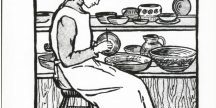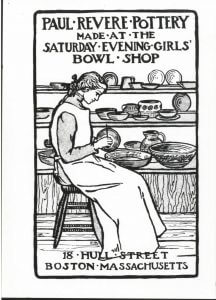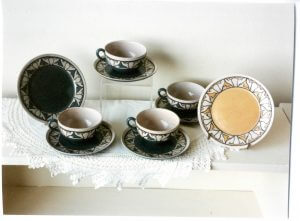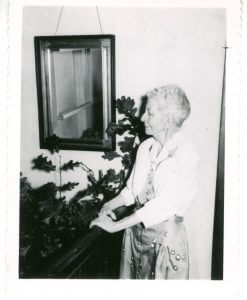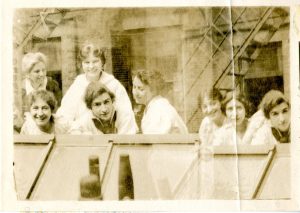Saturday Evening Girls
The story of the Saturday Evening Girls (SEG) is a compelling tale of female empowerment that dates back to an age when life offered women limited opportunities. The women who founded and became members of the SEG—many of them immigrants of Jewish and Italian heritage—strengthened one another’s lives through socialization, education and artistry that spawned self-esteem, leadership qualities and wage-earning skills.
“There’s something magical about the Saturday Evening Girls that makes you want to tell their story,” said Dr. Dorothy E. King, an assistant professor of Sociology at Penn State Harrisburg who is writing a book about the women of the SEG and their descendants. “It’s a story that has to be told; the kind of thing we need to embrace today as it harkens back to a time when it didn’t matter where you came from, but that you could go somewhere positive together.”
What began in 1899 as a reading hour on Saturday nights in Boston’s North End, grew to embrace women from surrounding neighborhoods like the West End and to publish a scholarly newsletter, host cultural performances and establish the Paul Revere Pottery.
According to the Museum of Fine Arts—which hosted an installation of SEG/Paul Revere Pottery works in 2006/2007—“Because of the design and color of the wares, and the reform-minded philosophy of the Pottery, products of the Saturday Evening Girls Club have become icons of the Arts and Crafts movement of the early 20th century.” Indeed, its pieces are highly collectible today.
Dr. King’s fascination with the SEG began when, in her role as chair of the Harrisburg Historical Association’s education committee, she brought in a guest speaker on vintage pottery collecting. At the end of that speaker’s hour-long presentation, he mentioned the Saturday Evening Girls, and that “sparked the sociologist in me,” Dr. King said.
She began reading in earnest about the group and learned about Barbara Kramer, whose mother had been an SEG member and who was the premier researcher on the club. Kramer had curated an SEG exhibit at UMass Boston in the 1990s. Dr. King tracked down Kramer’s daughter, Roz; reached out to UMass Boston’s archivist, Joanne Riley; and introduced the two of them. This led to Barbara Kramer’s papers becoming part of the university’s permanent collection. Throughout Dr. King’s years of research, each new connection has led to another, sustaining and reinforcing her desire to share the story of these remarkable women and their offspring.
“The women of the SEG just capture you, and they have to be celebrated for connecting across ethnic, religious and economic lines to form a sisterhood that empowered them throughout their lives and that lasted until their deaths,” King said.
The three most notable figures in this story are Edith Guerrier, Helen Osborne Storrow and Edith Brown. Guerrier was the North End librarian who first organized the reading hour that became the SEG and continued to lead the group as it evolved. Osborne Storrow, wife of James Storrow (as in Storrow Drive), donated major funding to the SEG and actively worked with its members. Brown, Guerrier’s partner and an artist and illustrator, also worked closely with the girls of the SEG.
In 1907, Guerrier conceived of the Pottery and enlisted Brown’s logistical and artistic help along with Osbourne-Storrow’s financial patronage. Storrow bought a house at 18 Hull Street to house the SEG (which was still holding reading groups) and the Pottery, as well as an apartment for Guerrier and Brown. As Dr. King wrote in an article for the Jewish Historical Society, “The house served as a meeting place for the clubs and a base of operation for the business. The basement held the kiln. The Bowl Shop, which sold the pottery, was on the first floor. Clubs met on floors one, two and three.
“According to SEG documents, the group was committed to ‘making it possible for many children (girls) to become acquainted with good literature, to learn to sing and dance and to belong to clubs which endeavor to spread the spirit of good comradeship.’ In addition, the clubs explored topics such as Sociology, Civics and Economics.”
The Paul Revere Pottery moved to Brighton in 1915—where Guerrier continued as business director, and Brown as artistic director—while the reading groups returned to the North End library. With the onset of WWI, many of the women turned their attention to supporting the war efforts at home, and this marked the end of the library clubs. But the Pottery maintained operations until 1942. And the women continued to gather routinely as friends until 1969, always referring to themselves as the Saturday Evening Girls.
In her memoirs, An Independent Woman, Guerrier recalled part of a speech she gave at the club’s first meeting, which holds important messages true in any age. “Someday you girls are going to enter the business world. You will need to know how to use the tool called mind, so that you can do your own thinking. You will need to know how to cooperate, and how to give and take with good-humored self-control. You will need to have a well-informed mind, and if you are to win positions with people you respect and admire, you will need to have a sense of the values of good literature, good music and good recreation.”
Today, Dr. King is working on the life stories of about 150 SEG members through the remembrances and reports of their descendants. On May 22nd, she hosted a reception at the West End Museum, which brought together many of these individuals. Children, grandchildren, nieces, nephews and family friends proudly shared stories and photo albums of their SEG ancestors.
“Some of the descendants didn’t originally know about the Saturday Evening Girls, but they have been so happy to discover their ancestors were involved and to dig into that history,” Dr. King said. “Others who did know are carrying on the legacy through art appreciation, education and civic-mindedness.”
So far, Dr. King has identified six SEG families who lived in the West End. She hopes to locate and interview even more descendants as she continues to work on her book. If you have a grandmother, great aunt or other relative who might have been a member of the group, please email Dr. Dorothy King.
Read more about the amazing women of the Saturday Evening Girls and Paul Revere Pottery at:
Brighton-Allston Historical Society – Boston’s Paul Revere Pottery: An Inspiring Experiment in Social Philanthropy
Incollect – The Saturday Evening Girls


